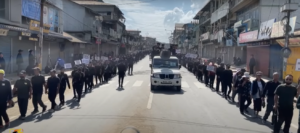Unau is your digital destination for celebrating the essence of brotherhood across the Kuki, Mizo, Zomi, and Hmar tribes.
Manipur, September 20, 2023 – The state of Manipur witnessed a dramatic turn of events on Tuesday as a 48-hour statewide shutdown, called by various Meitei Civil Society Organizations (CSOs), paralyzed normal life across the valley. The shutdown, which began at midnight on Monday, is demanding the unconditional release of five individuals referred to as “village defense volunteers,” who were arrested by the police.
The police allege that the arrested individuals were found in camouflage uniforms and in possession of sophisticated weapons. They are currently in police custody, facing serious charges. However, several Meitei organizations are strongly asserting that the detained individuals were indeed village defense volunteers and are demanding their immediate and unconditional release.
The situation escalated on Tuesday as people, predominantly women, took to the streets in various valley districts to endorse the shutdown. They imposed road blockades, effectively disrupting any semblance of normalcy in the state. The shutdown has had a profound impact on the daily lives of Manipur’s residents, affecting businesses, transportation, and essential services.
The demand for the release of the five detained village defense volunteers has become a focal point for the ongoing turmoil in Manipur. The dispute revolves around the identities and intentions of the arrested individuals.
On one hand, the police maintain that the arrested individuals were apprehended while wearing camouflage uniforms and carrying sophisticated weapons, suggesting their involvement in potentially unlawful activities. The police have not disclosed the specific charges against them but have promised a thorough investigation into the matter.
On the other hand, various Meitei organizations argue that the arrested individuals were bona fide village defense volunteers, tasked with maintaining the safety and security of their respective communities. They insist that these volunteers were not engaged in any unlawful activities and were wrongfully detained. Demands for their immediate release have been echoed across the state.
The shutdown, marked by road blockades, demonstrations, and the closure of businesses, has created a state of uncertainty and apprehension among Manipur’s residents. Schools, colleges, and government offices remained closed as a precautionary measure, affecting the education of students and the functioning of public services.
Transportation has also been severely disrupted, with road blockades impeding the movement of vehicles across the state. This has led to shortages of essential goods and supplies, creating an atmosphere of distress among the people.
In response to the escalating situation, security forces have been deployed to maintain order and ensure the safety of the public. However, their presence has not completely quelled the unrest, as demonstrators continue to demand the release of the detained village defense volunteers.
The state government has taken note of the situation and is under increasing pressure to intervene and address the demands of the Meitei CSOs. The government has also called for calm and urged citizens to express their grievances through peaceful means.
Political leaders and civil society leaders have started engaging in dialogues with the Meitei CSOs and other stakeholders to find a resolution to the crisis. The situation remains tense, with both sides entrenched in their positions, but there is hope that negotiations can lead to a peaceful resolution.
As the 48-hour shutdown continues, the people of Manipur anxiously await developments in the ongoing crisis. The release of the five detained village defense volunteers remains a pivotal issue, and the outcome of the negotiations between the government and the CSOs will determine the course of events in the days to come. Until then, normal life in Manipur continues to be profoundly affected, with uncertainty and tension prevailing throughout the state.








